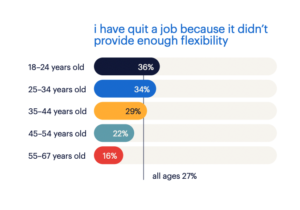The modern workforce is different to the generations before. People currently in their 20s and 30s, otherwise called the Gen Z and Millenial generations, are highly mobile, tech-savvy, socially conscious and insist on better work-life balance in a way their parents’ generation didn’t. Fast-tracked by the pandemic, these attitudes meant a radical shift in the dynamic between employee and employer during the pandemic. So why does this matter?
It matters because Gen Z workers are getting older. As more of them fast approach working age, combined with Millenials, they will very quickly become 50% of the workforce. As Europe continues to battle labour shortages, companies with a remote-first or a hybrid work model or those moving to a wholly digital environment are set to future-proof their recruiting capabilities. Flexible work policies represent a clear opportunity for companies to fill positions and retain staff. And this is why.
Leverage a broader talent pool
As WorkMotion Head of Trust and Employment Pieter Manden noted in his recent editorial, traditional means of combatting labour shortages are insufficient. Companies are doing themselves and their potential employees an injustice by not searching outside the geographical box. An increasing number of roles are becoming remote-friendly, and with countries like Brazil and India harbouring ca. 3 million unemployed people with a Bachelor’s Degree, remote-first policies represent an enormous opportunity for finding great talent without the hassles of relocation.
Improve recruitment opportunities
As for employment packages, workplace flexibility will go a long way to securing that perfect fit. A 2022 WorkMonitor study by Randstad found that 41% of Millenials and 40% of Gen Z workers would not accept a job if it did not provide workplace flexibility (remote work opportunities). It should go without saying that leaning into remote-first structures will make filling those critical roles much easier and relieve the heavy recruitment burden on HR teams.
While there aren’t any stats on it yet, we also think that once you factor in Temporary Work from Abroad policies, you’re fast becoming an employer of choice, especially among younger employees.
Increase employee retention
The future workforce like flexibility. Millennial and Gen Z workers are far more likely to leave their job, and they do. 41% of Gen Z workers have quit a job because it didn’t fit into their personal life. The study went on to show that of both Millenial and Gen Z, 36% and 34%, respectively, had quit a job because it did not provide enough flexibility. A separate Future of Work 2022 study by Buffer declared that, in all age groups, a whopping 97% of workers would like to maintain at least part-time remote work for the rest of their careers.
Increased diversity
Flexible and remote work policies invite underrepresented people into the workforce. Mothers, in particular, are better able to handle the shared responsibilities of work and child-rearing. According to a Future Forums survey, women with children said that the number one benefit of a flexible schedule is “being better able to take care of personal or family obligations during the day”. The Buffer survey went on to show that 76% of working parents pursued remote roles due to their situation.
The survey went on to say that flexible work benefits BIPOC communities too. For example, 68% of Black workers want flexible work policies, compared to 56% of their white counterparts, citing a better sense of belonging.
People living with a disability, who are otherwise restricted by either accessibility, mobility or inclusion, are also far more likely to enter the workforce when remote work is an option. In fact, 44% of those living with a chronic disability sought remote-first roles due to their situation.
And with improved diversity in the workplace, we have better commercial outcomes too. Increased diversity invites diverse thinking which, in turn, has an overwhelmingly positive effect on decision making, innovation, profitability and employee engagement. It’s a win-win.
WorkMotion
Ready to take the next step? WorkMotion specialise in all things remote work and global hiring. If you’d like to leverage the benefits of remote-first employment or build a global team, contact one of our specialists today.
Contact Us Today




